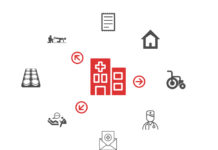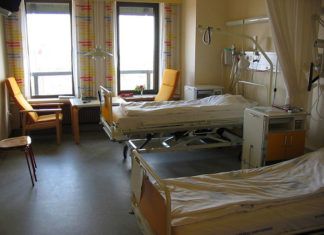How do expectant mothers experience their pregnancy in Germany? How are they supported during birth and what happens afterwards? Here is a brief overview.
“Can I still take my hay fever spray? Am I allowed to eat a bag of chips in the evening? Do I have to cancel my holidays in Tenerife?” When pregnant women visit their gynecologist for the first time, they have many questions. That is why counseling is the most important part of the first appointment. In addition, different medical examinations are carried out, on the one hand to ascertain the pregnancy without doubt, on the other hand to exclude any possible diseases of the woman that could lead to complications.
Always bring your maternity log
During their pregnancy, expectant mothers regularly visit their gynecologist. They receive a booklet, the so called maternity log (“Mutterpass”), where all of the examinations are recorded. In the case of an emergency, a doctor can assess the state of health very well. Therefore, gynecologists advise their patients to always take their maternity log with them, like an identity document.
During the medical check-ups, the pregnant woman is weighed so that the doctor can see how fast she is gaining weight. Also, her blood pressure is measured. If it is too low, it can cause circulatory problems, if it is too high, the doctor has to make sure that the woman does not suffer from any hypertensive heart disease. Furthermore, a urine sample is taken with every appointment because sugar or protein in the urine can be a sign of pregnancy-related diseases. The ultrasound examinations showing the heartbeat and the growth of the baby are especially moving for the future parents.
Delivery room or home birth?
98% of all women give birth to their child in a hospital, where the mother can be sure that her baby will receive optimal medical care. In the case of complications, the doctor or the midwife can intervene immediately. Especially when there is an increased risk for the infant at birth, pregnant women are advised to go to a hospital.
If there were no problems during pregnancy, the mother can also decide to go to a maternity hospital or have a home birth. A maternity hospital is an establishment where a birth takes place under the supervision of a midwife. Medical devices become less important. Instead, there are sitting balls, beds and bathtubs. The relationship with the midwife is also more intimate, as the mothers already got to know her during the antenatal classes and other appointments.
An even more intimate experience is a home birth which takes place in the pregnant woman’s own four walls. In this case, a midwife can be present, but it is not prescribed by law. Some women only want to receive help from their partner, close relatives or friends during their birth in their own living room.
The days and weeks after giving birth
After the birth, a midwife visits the mother at home to help her take care of the infant. How is the drinking behavior? How well does the navel heal? What should you do in the case of blocked milk ducts? When can you go for the first walk outside? All of these questions can be discussed with the midwife. In the beginning, the midwife visits the mother every day, but later the number of visits decreases until mother and child are an experienced team and don’t need the midwife’s advice anymore.
And who pays for all this? For future parents, medical support before and after birth are not associated with increased costs. Medical check-ups, support during birth and follow-up care are all paid by the health insurance. Unlinke in the USA, where there is freedom of choice concerning medical cover, health insurance is prescribed by law in Germany. You pay monthly contributions based on your income, but you have an insurance in the case of illness or birth.



























